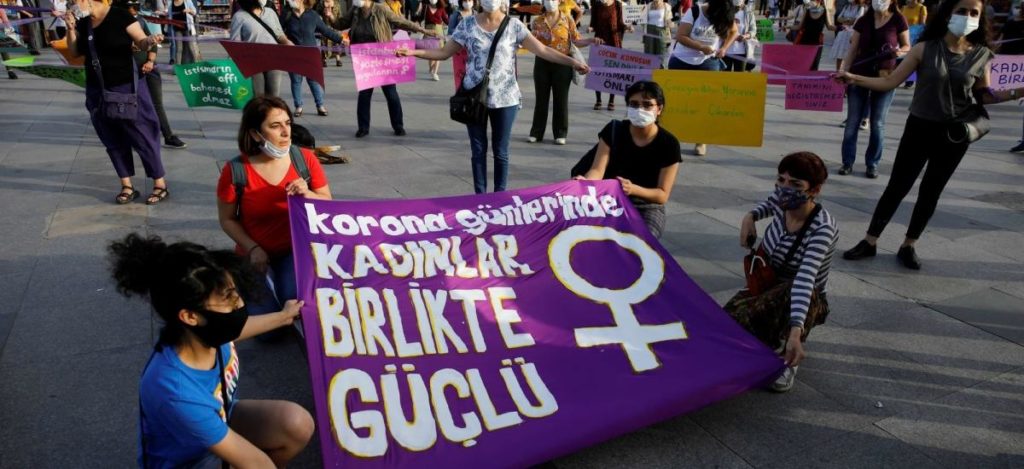Turkey and the European Union (EU) have always been close allies throughout the history. Despite certain challenges and recently tensed relations, this alliance remains valid in many fields today, such as migration, the fight against terrorism and organized crime, energy and security. Combatting violence against women, as a specific dimension of promoting human rights, is also amongst the major goals in common.
Violence against women is a multi-dimensional, worldwide phenomenon. It is a violation of gender-based human rights and also a form of discrimination against women. Its long-term consequences are not just limited to women's dignity, security, physical and psychological integrity, but they also have an overall impact on the society.
Major causes of violence against women illustrate a sophisticated connection with gender inequalities. This is a reality supported by statistical data, academic studies and experiences of women's rights organizations. Moreover, many of the international instruments explicitly set forth the relationship between gender inequalities and violence against women.
For instance, The Council of Europe Convention on Preventing and Combatting Violence against Women and Domestic Violence (known as the Istanbul Convention) implies the relation between violence against women and gender issues, and regards the former as an issue of human rights. The Convention is described by the Council of Europe as “the first legally binding and the most far-reaching international instrument in Europe on preventing and combatting violence against women, aiming zero tolerance for violence.”
As explicitly stated in its text, the instrument is built upon prevention of violence, protection of victim, prosecution of perpetrators and formulation of integrated governmental policies. It would not be wrong to claim that the Convention, stipulating certain obligations for the party states, is indeed a response to the long-lasting need of an international tool with a specific view to combatting violence against women. Having entered into force in 2014, the Convention involves a pan-European scope, establishing a binding legal framework beyond the frontiers of the EU.
Today, the EU attaches great importance to this landmark instrument. In October 2015, the Commission published a roadmap on EU accession to the Convention, mentioning its aim to generate a coherent framework at the EU level, for preventing and combatting violence against women, as well as supporting women and children who are victims.
Currently, all the EU member states and the Union itself are signatories to the Istanbul Convention, though there are still a few member states refraining from ratification on various grounds (such as Poland stating that the Convention is a neo-Marxist propaganda that contradicts with Poland’s value system and Hungary stating that the Convention endeavors to facilitate illegal migration and promote the LGBT ideology).
Yet, the EU’s dedication and enthusiasm to root out violence against women is embodied in the Commission’s Gender Equality Strategy 2020- 2025 where concluding the Union’s accession to the Convention and ensuring swift EU ratification are set amongst the priorities.
The commitment of the EU to the Convention is very significant in terms of the Union’s efforts and member states’ policies in promoting fundamental rights. It also sheds light on the strategies and action plans of the EU candidate countries, like Turkey, as they have to fully comply with the acquis on the road to EU membership.
The Istanbul Convention
Being one of the first countries to ratify the Istanbul Convention on 12 March 2012, it is an advantage and remarkable achievement for Turkey to have ratified the convention even earlier than some of the EU member states. However, this success that needs to be much appreciated is being undermined and even questioned today in the country.
The national approach to the Istanbul Convention has recently become controversial as some politicians and associations started to question the decision to sign and ratify the Convention, asserting explicitly that “it was a mistake that should be revoked” and even saying “we signed the Convention without grasping its provisions,” in a way to admit the lack of merit of the relevant authorities.
One of the criticisms targeting the Convention is based on the claim that the Convention neglects the attributed roles of women within households and merely focuses on them individually, amounting to a complete disregard of women’s roles in the family. In contrast to this claim, the backers of the Convention assert that regarding women as individuals (not necessarily as a part of the family) indeed serves better for combatting violence against women.
This argument is also in line with the approach of the current Turkish Penal Code (for example, after the thorough transformation of the Code in 2004, the offence of sexual violence is now defined under the heading of “Crimes against Individuals,” not under the heading of “Crimes against the Society” anymore, reflecting the idea of valuing women primarily as individuals and putting their integrity first, in line with the provisions of the Istanbul Convention).
Another criticism is indeed attributed to religious and conservative concerns. Some of the opponents of the Convention are accusing the instrument of degrading the core values of the Turkish society, such as honour, and regarding religion as one of the causes of violence against women. Nonetheless, such criticisms are mostly based on a false interpretation of the provisions of the Convention.
A purposive and cumulative interpretation of the text of the Convention and its explanatory report should be made to ensure a better understanding of the instrument’s wording and aims. Only then, it would be possible to appreciate that the Convention is not provoking against any religion.
What it actually intends to do is simply reject the justification of any form of violence on the grounds of religion, meaning that it respects all religions and aims to prevent their abuse by being presented as possible excuses of violent acts. That is exactly why the Convention refers to “so-called honour” (not to “honour” itself) and tries to avoid it from becoming a justification of violence.
Honour itself is a part of human dignity which is already safeguarded by many human rights instruments at global level (such as the European Convention on Human Rights, the EU Charter of Fundamental Rights). It goes without saying that the Istanbul Convention cannot be possibly contradicting with those widely ratified human rights tools.
Thus, contrary to the criticisms, the Convention values and respects honour, but excludes any form of violence that is based on “so-called honour”. Thus, the distinction between these two terms is very critical to make. The interpretation of the provisions of the Convention should be made with due diligence, definitely by consulting to legal experts who have both a good command of the English language and deep understanding of human rights.
Otherwise, should the text of the Convention is just translated by an authorized translator with no background in law and interpreted later by people who do not have thorough knowledge and expertise in the field, the controversy will inevitably deepen.
Moreover, one of the further disputes derive from the controversial interpretation of Article 4 of the Convention, which mentions gender identity. Despite the discourse of some politicians in Turkey who try to defend the Convention by saying that it does not explicitly state anything about the rights of the LGBT people or same sex marriages and therefore there is no reason to worry about the values of the Turkish society, the article indeed protects the rights of LGBT people, prohibits discrimination against them and treats all persons equal before the law.
This is not something that needs to be covered up to exonerate the Convention since it is exactly what needs to be envisaged by laws and international human rights documents. The fact that the Convention is differentiating between gender by birth and gender by identity is concretely embodied in its Explanatory Report.
The views that try to deny the rights of LGBT people need to face the reality of our era and realize the notion of human rights and its achievements in terms of anti-discrimination. Protecting the rights of transgendered people cannot harm the ethical values of a country, but instead, would reinforce them further through respect and tolerance towards diversities in the society.
What impact would a withdrawal have on Turkey-EU relations?
Bearing in mind the aforementioned wrong and ill-founded interpretations and considering Turkey’s leading success in signing and ratifying the Convention, it would be a huge mistake and backsliding for Turkey to withdraw from the Convention.
Alongside its potential catastrophic consequences for women in the country, a withdrawal would definitely undermine the country’s historical achievements and legislative reforms. The opponents of the Convention need to realize that it is not just the Istanbul Convention but also other international tools that Turkey is bound with (such as CEDAW), and that they all require states to modify and abolish discriminatory traditional patterns and social attitudes “which are based on the idea of the inferiority or the superiority of either sex or on stereotyped roles for men and women.”
Thus, it is should be admitted that eradicating inhuman traditional practices (such as crimes committed in the name of blood feud or family name) and altering some of the cultural patterns (such as patriarchal discourses, stereotyped attitudes toward the roles of women and bad practices) are inevitable and necessary to effectively combat violence against women.
It should be borne in mind that such modifications do not necessarily mean assimilation in the sense to lose traditional, ethical and cultural values, but simply mean improvement in the field while preserving the core and precious traditions and rich culture of Turkey.
To put in a nutshell, there is no doubt that Turkey’s EU accession road has always been (and is still being) affected by the evolutions and challenges in the field of combatting violence against women. As a result of the long-lasting endeavors of women’s organizations (especially boosting in 1980s), academics and the EU candidacy prospect, Turkey now has a very comprehensive and strong law (Law no.6284) in the field today, offering a variety of solid and firms measures and protection to realize the provisions of the Istanbul Convention.
Thus, as an EU candidate country, Turkey should be aware of its strong achievements at international level in the field and focus on avoiding any backsliding in that regard. The ill-founded suggestions of withdrawing from the Istanbul Convention should be ceased without wasting any more time.
Once interpreted accurately, there is no doubt that the Convention serves for enriching and reinforcing the country’s achievements while also respecting its traditional and religious values. In addition, given the importance attached to the Convention by the EU, it is not hard to predict that in the case of a withdrawal, Turkey will move further away from the EU and EU membership will become less credible.
It is hope inspiring that Turkey and the EU have long taken aligned steps in the field of combatting violence against women. The legislation and practice of the two parties demonstrate strong analogy. Such a trend of harmonized legislation and aligned efforts should be continued in the future, not just for Turkey’s EU membership prospect, but also for women in Turkey to enjoy the rights and protective measures offered by the Istanbul Convention.
By Sukran Unal


